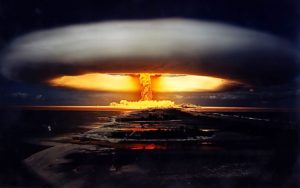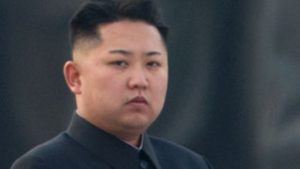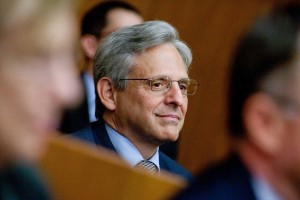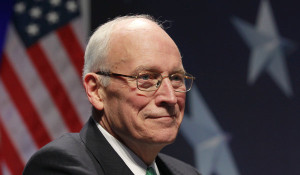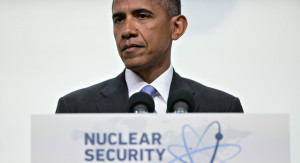
Barack Obama demonstrated today a compelling command of the obvious when he said the Republicans’ leading candidate for president “doesn’t know much about foreign policy.”
The president was responding to comments from Donald J. Trump about allowing South Korea and Japan develop nuclear weapons programs.
Yep, Trump said he would be open to that possibility as a deterrent to North Korea’s nuclear ambitions.
According to Politico: “The person who made the statements doesn’t know much about foreign policy or nuclear policy or the Korean peninsula or the world generally,” Obama told reporters as he finished the last of a series of high-level meetings on nuclear security in Washington.
“The person” to whom Obama was referring also said the United States shouldn’t even rule out using nuclear weapons to fight the Islamic State in the Middle East and, oh yes, in Europe.
Oh … my.
That’s the obvious criticism: that Trump doesn’t know diddly about U.S. foreign policy, its aims, how it protects U.S. interests and how it intends to maintain peace.
What is not so obvious is the question that the president didn’t ask. Perhaps he didn’t want to stick the proverbial hot branding iron in the eye of the Trumpsters who keep cheering their man on.
I’ll ask it here: How is it that the individuals who keep voting for this guy give him a pass on such obvious ignorance?
I am acquainted with some Trumpsters here in Amarillo. They keep answering with the same refrain: Trump “tells it like it is”; political correctness be damned!
As Ricky Ricardo might say: Ayy, caramba!
Trump’s ignorance keeps revealing itself in breathtaking fashion.
Just this week alone, he said women should be “punished” if they obtain an illegal abortion; he then reversed himself … twice! Then came the remarkable assertion about the use of nukes to fight radical Islamic terrorists. To be fair, he didn’t pledge to drop A-bombs on them, only that we shouldn’t take their use “off the table.”
Still, this individual does not grasp the meaning and the gravitas of what he says. As the president noted today in his remarks, the world pays careful attention to what major political leaders in this country say. Obama said: “I’ve said before that, you know, people pay attention to American elections. What we do is really important to the rest of the world, and even in those countries that are used to a carnival atmosphere in their own politics want sobriety and clarity when it comes to U.S. elections because they understand the president of the United States needs to know what’s going on around the world.”
Trump may say he’s not a politician, but that’s now patently untrue. He is a politician seeking the highest office in the land. He seeks to become chief executive, the head of state and the commander in chief of the United States of America.
Yet he keeps shooting off his mouth about matters of which he knows not a single thing.
How in the name of all that is holy does this clown keep getting away with it?

